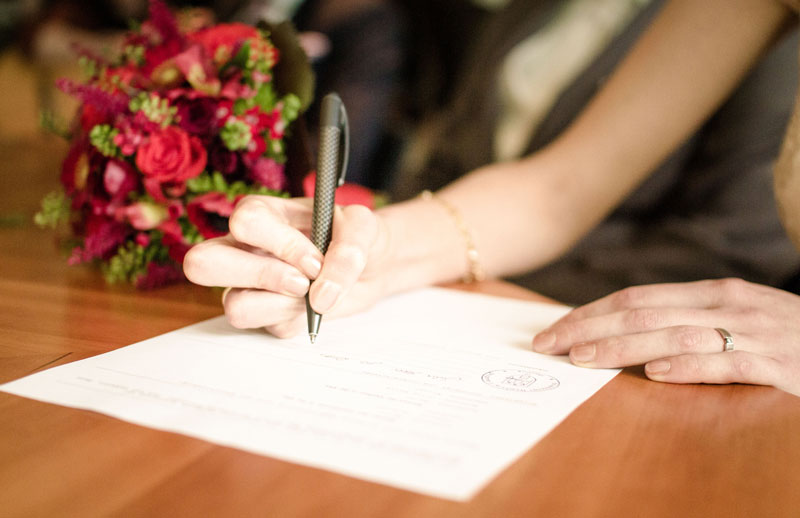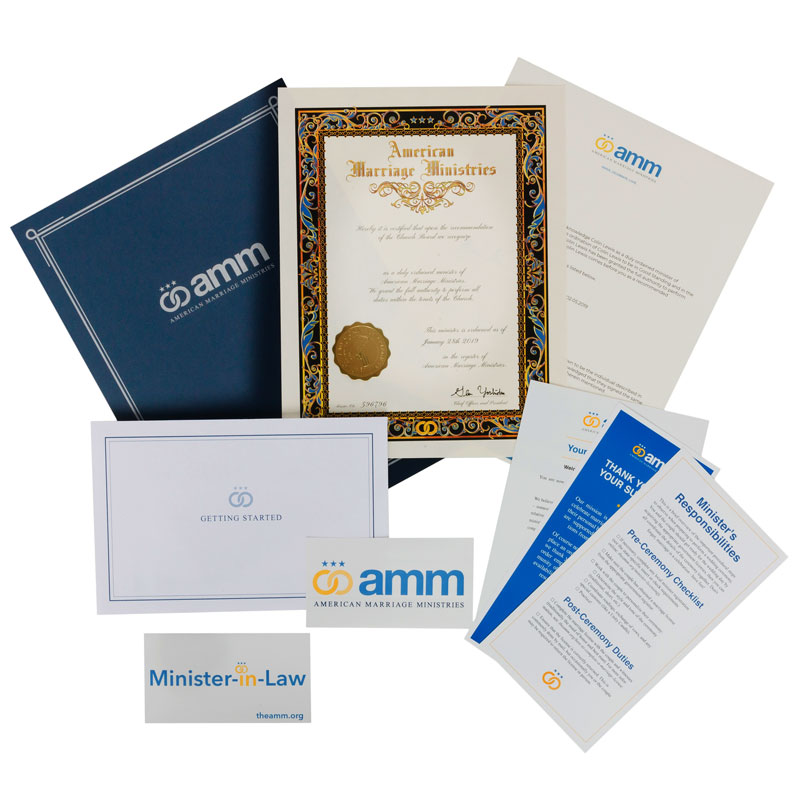Become an Oregon Wedding Officiant with ourFree Online Ordination
If you are considering getting ordained online to officiate weddings in Oregon, then you have come to the right place. The first thing you should know is that it is 100% legal for you to get ordained online in Oregon to officiate weddings. Keep reading to learn more about why online ordinations are legal in Oregon and how you can get ordained to officiate weddings anywhere in the State.
5 Oregon Online Ordination Facts
Who can perform marriage in Oregon?
” (2) Marriages may be solemnized by: (a) A judicial officer; (b) A county clerk; (c) Religious congregations or organizations as indicated in ORS 106.150 (2); (d) A clergyperson of any religious congregation or organization who is authorized by the religious congregation or organization to solemnize marriages; (e) Secular organizations as indicated in ORS 106.150 (2); or (f) A celebrant or officiant of any secular organization described in paragraph (e) of this subsection who is authorized by the secular organization to solemnize marriages. ”
Oregon Revised Statutes § 106.120
Does the Oregon government recognize online ordained ministers?
Yes. As clearly stated in the State Law, ministers that were ordained online are no different than ministers ordained by any other means, be it in-person, or through years of seminary study. Ordained means ordained. Period. Get Ordained Now
Are wedding officiants required to register with the Oregon Government?
This may come as a surprise to you, but wedding officiants in Oregon do not have to register with any government office before or after officiating wedding ceremonies. There are no laws in Oregon requiring that officiants register with any government office and there is no government office charged with such a responsibility.
What Oregon government office must the officiant contact before performing marriage?
None. The Oregon government does not have any office that registers, certifies, or licenses wedding officiants. Simply put, at no point in your journey from ordination to officiating are you required to contact or register with any Oregon government office.
What is the minimum age allowed for a wedding officiant in Oregon?
In Oregon all wedding officiants must be at least 18 years old to be able to legally solemnize marriage. Basically, in addition to being an ordained minister, you must also be a legal adult.
How Are Oregon Online Ordinations Legal?

To better understand the legal underpinnings of how online ordinations work in relation to gaining the authority to officiate weddings in Oregon, it is helpful to familiarize yourself with an esoteric legal term, “Solemnization of Marriage”. Solemnization of Marriage is simply a fancy way of saying, “Perform Marriage”, “Conduct a Wedding”, or “Officiate a Wedding”. Solemnize is the official act of conducting a wedding ceremony. This is how the act of performing a wedding ceremony is described in the Oregon Revised Statutes. Below is the law that specifies who exactly can Solemnize Marriage in Oregon:
Oregon Revised Statutes § 106.120
(1) As used in this section: (a) “Judicial officer” means: (A) A judicial officer of this state as that term is defined in ORS 1.210 and includes but is not limited to a judge of a municipal court and a justice of the peace. (B) An active judge of a federal court. (C) An active United States magistrate judge. (b) “Secular organization” means an organization that occupies a place in the lives of the organization’s members parallel to that filled by a church or particular religious authority. (2) Marriages may be solemnized by: (a) A judicial officer; (b) A county clerk; (c) Religious congregations or organizations as indicated in ORS 106.150 (2); (d) A clergyperson of any religious congregation or organization who is authorized by the religious congregation or organization to solemnize marriages; (e) Secular organizations as indicated in ORS 106.150 (2); or (f) A celebrant or officiant of any secular organization described in paragraph (e) of this subsection who is authorized by the secular organization to solemnize marriages. (3) A person authorized to solemnize marriages under subsection (2) of this section may solemnize a marriage anywhere in this state. (4)(a) When a marriage is solemnized by a tax, appellate or circuit judge of this state, the clerk of the court or the county clerk shall collect a fee of $117 and deposit the fee in the Judicial Department Operating Account established in ORS 1.009. (b) When a marriage is solemnized by a county clerk, the county clerk shall collect a fee of $117, as provided in ORS 205.320. (c) The fee described in this subsection may be collected only if: (A) The marriage is solemnized during normal working hours, excluding holidays; (B) The marriage is solemnized in court facilities or a county clerk’s office; or (C) More than a minimal amount of staff time or other court or county clerk’s office resources are used in connection with the solemnization. (d) The Chief Justice of the Supreme Court or the county clerk may establish a written procedure for waiver of the fee required under this subsection in exigent circumstances, including but not limited to indigency of the parties to the marriage. (5) In addition to any fee collected under subsection (4) of this section, a judicial officer of this state and a county clerk may charge and accept an agreed upon personal payment not to exceed $100 plus actual costs for the solemnization of a marriage if that solemnization is performed: (a) At a place other than the courthouse where the judicial officer or county clerk serves; or (b) Outside of the judicial officer’s or county clerk’s normal working hours. (6) The charging and accepting of a personal payment by a judicial officer of this state or a county clerk under subsection (5) of this section does not constitute a violation of any of the provisions of ORS chapter 244. (7) The amount of actual costs charged by a judicial officer of this state or a county clerk under subsection (5) of this section may not exceed: (a) Actual expenses for food and lodging as verified by receipts. (b) If travel is made by personal vehicle, the actual number of round-trip miles from the judicial officer’s or county clerk’s home or office, whichever is greater, compensated at the rate of reimbursement then provided by the State of Oregon to its employees or, if travel is made by a commercial carrier, reimbursement shall be made of the actual costs thereof, verified by receipts. (8) A judicial officer of this state or a county clerk shall maintain records of the amount of personal payments received for performing marriages, of actual costs and the supporting documentation related thereto for a period of four years. (9) The parties to a marriage solemnized by a tax, appellate or circuit judge of this state shall show to the judge proof of payment of the fee required under subsection (4)(a) of this section before solemnization. Except as provided in subsection (4)(d) of this section, the judge may not solemnize a marriage without proof of payment of the fee.
Oregon Revised Statutes § 106.120 Explained
If this law looks like an indecipherable wall of text, don’t worry. Let’s focus in on the part that is relevant to you.
“2) Marriages may be solemnized by: … (d) A clergyperson of any religious congregation or organization who is authorized by the religious congregation or organization to solemnize marriages; “
This law allows for people of any religious faith to self actualize their ability to officiate wedding ceremonies. Beyond being articulated in the Oregon Revised Statutes, this right is also enshrined in the 1st amendment of the US Constitution:
“Congress shall make no law respecting an establishment of religion, or prohibiting the free exercise thereof; or abridging the freedom of speech, or of the press; or the right of the people peaceably to assemble, and to petition the Government for a redress of grievances.”
We hope this better explains the legal foundation for why you absolutely have the right to officiate wedding ceremonies in Oregon as an online ordained minister. As long as you are a member of any religious institution that grants you the authority to solemnize marriage, you are good to go. So what are you waiting for?
Oregon Officiant Government Registration

We said it before but it bears repeating – In Oregon, wedding officiants are not required to register with any government office. The government in Oregon does not impose any officiant registration process whatsoever. At no point in your journey from getting ordained to officiating the wedding ceremony are you required to complete government paperwork confirming your status as a wedding officiant. Once you are an online ordained minister you instantly have the legal ability to perform marriage anywhere in Oregon.
Though there is no legal requirement to prove your standing as an Ordained Minister with any Oregon government office, we do recommend that you keep personal records of your official Ministry Credentials. A physical copy of your Ordination Certification is useful to have in the event that the couple or anyone else affiliated with the wedding asks to see proof of your ordination.
If you choose to get ordained with American Marriage Ministries, consider ordering one of the following packages. In addition to your official ordination certificate you will also receive your “AMM Minister’s Manual” and “Asked To Officiate“. Both of these books cover all of the important information you need to know regarding your legal duties as a wedding officiant and your ceremonial responsibilities, including how to best prepare for the ceremony.
How Do I Prepare For Officiating Weddings in Oregon?

Getting ordained is just the first step. The bulk of your time and energy will be taken up in preparing for the wedding ceremony. We know that conducting a wedding ceremony is a big responsibility. And though it is a joyous experience it is also one that needs to be taken very seriously, especially for your role as the wedding officiant.
We will walk you through the process from both the legal and ceremonial aspects of your role as the wedding officiant. Check out our page How To Officiate Weddings to get started. Here we cover the important things that you as the officiant need to do, such as how to best prepare for officiating a wedding ceremony and Writing the Wedding Ceremony. For more information, we encourage you to visit the official American Marriage Ministries website. There you will find the most comprehensive officiant training materials you can find online.
Many of the people that get ordained online have never officiated a wedding before. We know that this can seem intimidating and have anticipated your need to understand the entire process. Our mission is to empower you not just to officiate weddings, but to do so with skill, confidence, and dare we say, a bit of style.
Officiating a wedding in Oregon can be broken down into two responsibilities. These are:
- Non-Legal Duty – Officiating the Wedding Ceremony
- Legal Duty – Signing the Marriage License
To learn more about preparing for the wedding ceremony, including how to write a wedding ceremony script, check out the Officiant Training on the American Marriage Ministries website. Keep reading to learn more about the officiant’s legal responsibilities regarding the marriage license.
Oregon Wedding Officiant Legal Responsibilities

Your one legal responsibility as a wedding officiant in Oregon is to sign the marriage license for the couple. This is a simple bureaucratic process that is really no different than signing any other type of legal contract.
However since it is not every day that you fill out marriage licenses, you may find some of the fields confusing at first glance. We have deconstructed the process of completing a marriage license into easy-to-follow instructions in case you find something confusing along the way. We understand how important it is to get this right, so keep reading for instructions on how to complete an Oregon marriage license.
How To Fill Out an Oregon Marriage License
It is your responsibility as the wedding officiant to sign the marriage license on the wedding day. We have broken this duty down into four simple steps:
- Ask the couple to present their marriage license.
- Confirm that the marriage license is valid.
- Complete and sign the marriage license.
- Return the Marriage License.
STEP 1 – ASK THE COUPLE TO PRESENT THEIR MARRIAGE LICENSE
At some point on the wedding day, you need to ask the couple to present their marriage license. Generally this happens immediately following the ceremony while everyone heads out to the reception. Though this doesn’t have to be the case, as the marriage license can be completed at any time on the wedding day before or after the ceremony.
STEP 2 – CONFIRM THAT THE MARRIAGE LICENSE IS VALID
Before you start filling out the marriage license you need to confirm that it is currently valid. A marriage license’s validity is determined by three laws that specify the marriage license waiting period, expiration, and return. If you need further clarification on what these terms mean, there is a good explanation here. The information below outlines the waiting period, expiration, and return for Oregon marriage licenses:
- REQUIRED WITNESSES: Two Adults
- WAITING PERIOD: 3 Days Before Completing
- EXPIRATION: 60 Days
- RETURN: Within 5 Days after the Wedding
In practice, verifying the validity of the marriage license is usually a formality. Most couples file for their marriage license a week or two before the ceremony date, in which case the marriage license, according to state law, is valid.
STEP 3 – COMPLETE AND SIGN THE MARRIAGE LICENSE
This is where the pen finally meets the paper. As the officiant you need to fill out your portion of the marriage license. When done, you must sign it with the couple and two adult witnesses (they are also required to sign the marriage license).
If you are not sure how to fill out certain fields on the marriage license, do not worry. Below are the most common questions people have regarding filling out a marriage license. The marriage license you will be completing may not have all of these fields.
OFFICIANT TITLE ON MARRIAGE LICENSE
For officiant title, enter“Minister”. If you are an AMM ordained minister, then that is what you put for your title.
CHURCH NAME ON MARRIAGE LICENSE
For church name, enter“American Marriage Ministries”. That is unless, you got ordained through a different organization, in which case enter the name of that organization.
RELIGIOUS DENOMINATION ON MARRIAGE LICENSE
For religious denomination, enter “Non-Denominational” unless you are officiating the wedding according to a specific religious tradition. If so, then enter that.
CEREMONY TYPE ON MARRIAGE LICENSE
For ceremony type, enter “Religious”. It is important to understand, even if you officiated a completely non-religious ceremony you still need to enter “Religious”. The reason for this is that the designation “Religious” and “Civil” mean something different to the Oregon Government. Civil is a designation for government officials. Everything else is considered religious, even if you invoke no religious references in your wedding ceremony.
STEP 4 – RETURN THE MARRIAGE LICENSE
After the marriage license is completed it must be returned to its issuance office. This is usually the responsibility of the couple though it is a good practice as the officiant to follow-up with the couple to make sure that the completed marriage license has been returned. As this is generally done through the mail, it is an easy thing to do and we recommend that it be done ASAP after the wedding.
If you are unclear on where or how to return the marriage license, the couple should know. When the couple receives their marriage license they also receive specific instructions on how to return the marriage license. If these instructions are not included with the marriage license, you can call the issuance office or visit their website for further clarification.
Thanks for reading and go get your officiating on! To learn more about getting ordained online and how to officiate weddings, check out American Marriage Ministries.





